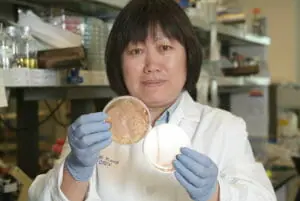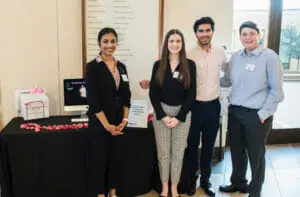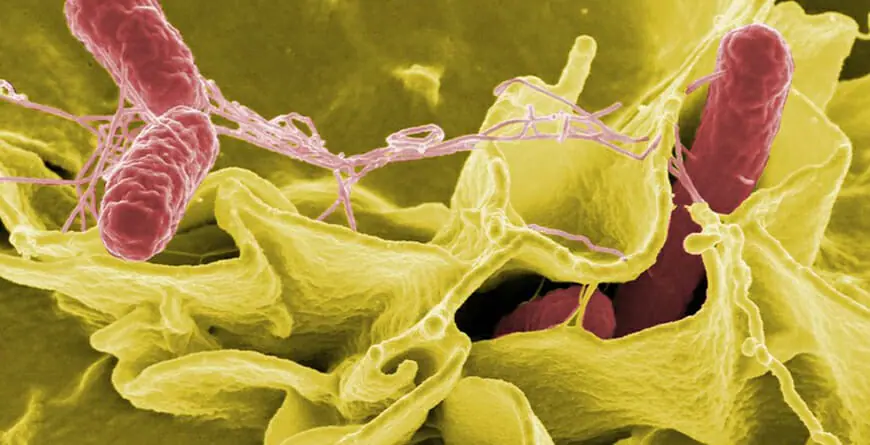Standard-of-care treatments—chemotherapy and radiation—remain at the forefront of cancer therapy, but in light of the high rate of recurrence and treatment failure still observed for most cancer subtypes and the high toxicity conferred by current practices, new and innovative therapies are being pursued.
These approaches include engineering viruses and bacteria to attack cancer cells, while leaving non-cancerous, healthy cells untouched.

This line of research is quickly becoming a hot topic for its targeted and novel approach. To commend ASU researcher Wei Kong, an associate research professor in the Biodesign Center for Immunotherapy, Vaccines and Virotherapy, and her research team for employing this strategy, ASU Women and Philanthropy awarded $100,000 to their “Using Microbes to Combat Breast Cancer” project.
On May 7, Kong and other recipients of the grant were recognized at a virtual ceremony, with a special address from astronaut Cady Coleman.
ASU Women and Philanthropy empowers young women to pursue their passions and give back to society through their innovative research. Kong’s research exemplifies this standard.
“Women and Philanthropy tries to take on new challenges and drive innovative solutions by supporting research projects that will have an impact on society,” Kong said. “I think part of the reason why we won this award is because we have a young research team, made up of undergraduate students and even high school students.”
“We are not only crafting next-generation treatment strategies that are accessible and affordable, but we are also growing next-generation researchers who believe they can do the impossible.”
Kong’s research is centered around engineering Salmonella bacteria to treat cancer. The research team accomplished this in a variety of ways.
First, the researchers reduced the pathogenicity of Salmonella to make it safe and enhanced the expression of receptors that can recognize small molecules released by cancer cells. This directs the engineered Salmonella to the tumor site, wherever it is in the body.

“Normally, Salmonella infects the host’s intestinal tract and spreads to the body after crossing the epithelial layer of the gut. But after enhancing the expression of these chemoreceptors, the bacterial cells will ignore the spaces they typically inhabit and target the cancer cells instead,” Kong said.
Next, the researchers packed anticancer material into the bacteria, in what Kong calls a “Trojan Horse” approach. Upon tumor infiltration, the bacteria lyse and release these anticancer particles, destroying the cancer cells.
In doing so, the bacteria are also able to recruit the help of the immune system.
“Cancer cells can hide from the immune system by mimicking normal human cells – Salmonella can mediate this,” Kong said. “They not only preferentially colonize the tumor, but they also turn the tumor into an infected site – the immune cells come to the tumor to clear out the Salmonella, which exposes the cancer cells to immune destruction as well.”
Finally, a pH feature was added to the bacteria to make the tumor microenvironment more basic. Cancer cells change their environment to be more acidic, meaning healthy immune cells that typically inhabit more neutral environments are suppressed in the tumors.
“We want to change the tumor microenvironment to bring the pH up, so that immune cells can serve their function,” Kong added.
Kong’s research group originally tested out this engineered bacterium in colon cancer due to the fact that Salmonella naturally inhabits the gut and because tumors in the colon are easily visualized. In a mouse model, a significant decrease in tumor progression was observed, a testament to the efficacy of this approach.
But the researchers didn’t stop there.
One in eight women develop breast cancer in their lifetime. This high incidence draws a great deal of interest, as most people across the globe have had or know someone who has had breast cancer. Luckily, in theory, this approach should work for all cancer types, including breast cancer.
“This cancer therapy proved to be successful in suppressing cancer progression and metastatic spread for colon cancer,” Kong said. “The mechanism by which Salmonella attacks cancer should be universal. They provoke the immune response, and they target cancer cells directly, so it should work for all types of cancer through a suitable delivery route.”
Although it has only recent years gained traction, this concept isn’t new. Dating back to the 1880s, it was recognized that patients with bacterial infections experienced a drastic decrease in the size of their tumors. However, until recently, researchers didn’t know how to selectively kill cancer cells without harming healthy cells.
Kong’s engineered bacteria self-destruct after releasing their anticancer material, meaning the bacteria are no longer free to roam the human body, posing risks for healthy cells.
That being said, convincing patients of this approach remains a challenge.
“It is hard to convince healthy people to be administered Salmonella, but for cancer patients that are out of therapeutic options, if we have something really safe and powerful to cure the disease, it could be easier for us to rack up interest,” Kong said.
For the members of the Women and Philanthropy group, this line of research was especially impactful.
“Some members came to us with their experiences, their suffering, their family and friends’ suffering. They told us a lot of touching stories of people in their lives who fought cancer, especially breast cancer,” Kong said.
“For this reason, we are extremely honored to receive this award and so thankful to ASU Women and Philanthropy for supporting our project. We feel that they put their hopes in us to find a cure to this devastating disease, so that’s why we feel a responsibility to make this work.”
For Kong and her research team, this is not only a means to fund further research, but it is also a way to prove the impact this therapy could have on human lives.
“This award is not only money – ASU Women and Philanthropy believes in the power of these ideas, and society really appreciates the effort we have put into this project.”
